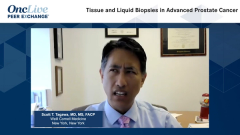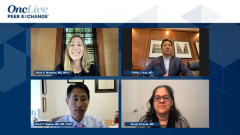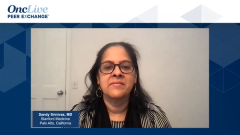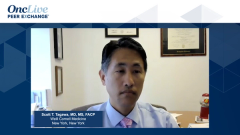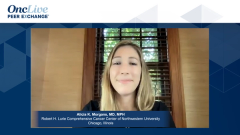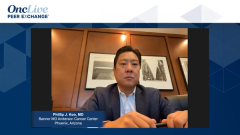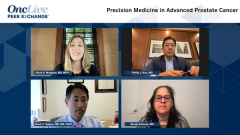
Triple Therapy Approaches for mCSPC
Potential implications for treating metastatic castration-sensitive prostate cancer with triple therapy based on recently reported data.
Episodes in this series

Alicia K. Morgans, MD, MPH: We saw some interesting presentations recently, and 1 not as recently, on the use of triple therapy, ADT [androgen deprivation therapy] and docetaxel chemotherapy followed by or concurrent with either enzalutamide in the ENZAMET trial, or abiraterone in the PEACE1 trial. Both of these trials showed a pretty significant improvement in progression-free survival. PEACE1 most recently reported and showed a 2½-year difference in progression-free survival radiographically. I’m curious about both of your thoughts on triple therapy. It’s not recommended at this point. We don’t have survival data. But what are your thoughts and practices, Sandy?
Sandy Srinivas, MD: I found that really interesting at this year’s ASCO [American Society of Clinical Oncology Annual Meeting]. Alicia, as you mentioned, we’ve seen ENZAMET from a couple of years ago, when it had become standard based on CHAARTED, and there were many patients getting docetaxel. Overall, that trial was interesting because those patients who had ADT-enzalutamide and docetaxel had an improvement in clinical progression, but there was no improvement in overall survival. For the group who had docetaxel, that benefit with enzalutamide was a lot lower compared with those patients who didn’t get docetaxel. Prior to this year’s ASCO, it’s been our standard to not do triple therapy, but we were looking forward to results from PEACE1. There’s 1 more trial using darolutamide with chemotherapy, so we were awaiting those results.
Coming to this year’s ASCO, I thought PEACE1 was really interesting. This trial looked at standard of care—they defined standard of care as ADT—and patients were on docetaxel. They had 2 cohorts of patients. The whole intent to treat was about 800 patients, and the group that had docetaxel had about 300 patients in each arm. As you said, they found a pretty remarkable improvement in radiographic progression-free survival at close to 2½ years for the group who had all 3. We didn’t even get to see a glimpse of the overall survival because it was premature. It comes with a price in terms of toxicity suddenly when you add 3. But considering our previous conversation, where we’re having difficulty in this country having patients do dual therapy, with just ADT intensification, the standard would be to do ADT intensification and not offer patients all 3 as we wait more on the overall survival. Especially because there was some difference between the ENZAMET trial vs PEACE1, I’d certainly wait until we hear more overall survival results.
Alicia K. Morgans, MD, MPH: Thank you. That was a wonderfully well-thought-out answer. It’s really interesting, because I feel like so many of us have our own takes on these data. After Karim Fizazi presented at ASCO, the moderator started that conversation and it was a completely split panel. Some people said, “I’d consider doing this intensification of a third agent now.” Others said exactly as you said, “I really want to wait for that survival of understanding how this triplet will affect survival, given all the costs associated with it. Not just financial costs but also potentially in terms of quality of life.” Scott, what are your thoughts?
Scott T. Tagawa, MD, MS, FACP: I was very impressed with the PEACE1 data. It was a very well-done study that adjusted during. But unfortunately, it asked an old question. Meaning, in my practice, the most common therapy is ADT plus AR [androgen receptor] pathway inhibitor. In my mind, the question is, what about the addition of docetaxel to that? We’re not really going to get that answer, even with ARASENS. Longer follow-up and additional data sets will have a lot of prospective numbers, and then we may be able to look at that in a meta-analysis and see how much better it is than ADT-abiraterone, or ADT-apalutamide, or ADT-enzalutamide alone. I’m not sure it’s ever going to be the standard as an all-comers approach for me.
There are additional questions to answer. What else can we add to it? Whether that’s a PSMA [prostate-specific membrane antigen]–targeted radionuclide or a PD-1 agent. There are other PARP inhibitors in that setting that I find more intriguing, and I have hope for those. But for individual patients, that could be a right answer. I don’t think it’s necessarily ever going to be the right answer.
Alicia K. Morgans, MD, MPH: We’ll have to see. I have hopes that we’ll get some follow-up overall survival data from ENZAMET, PEACE1, and ARASENS, which is chemotherapy plus or minus darolutamide, in the next year, or that we can at least answer whether an AR-targeted agent adds anything to chemotherapy. As you said, 1 of the main questions is, does chemotherapy add anything to AR-targeted agent intensification? We don’t know yet.
Transcript Edited for Clarity


